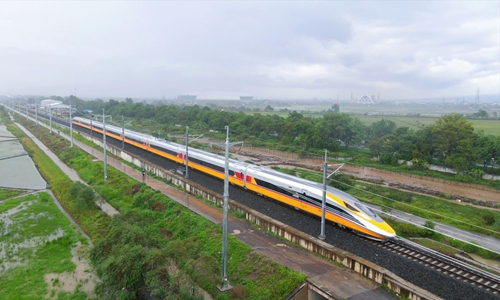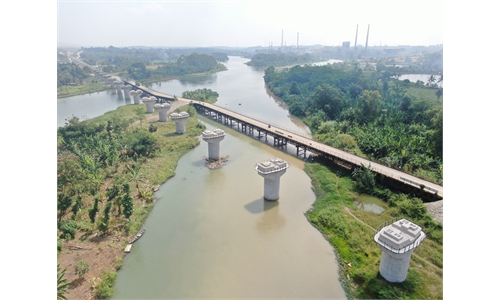Trial train run on a section of Jakarta-Bandung High-speed Railway is completed successfully

Trial operation of the Jakarta-Bandung High-speed Railway successfully completes on Wednesday. Photo: Courtesy of China Railway
The trial operation of the Jakarta-Bandung High-speed Railway (HSR) was completed on Wednesday, with the results from a comprehensive trial run of the rail line showing good performances, China Railway International Co announced. It is expected that the railway will be put into commercial operation in June 2023.
The 14-kilometer testing section ran between Tegalluar Station and Casting Yard No.4. The high-speed train conducted a test run, checking multiple systems including the roadbed, tracks, wireless telecom links, signals and electricity supply. The trial train was built using Chinese standards while taking account of the actual operating conditions in Indonesia.
The train is able to measure more than 60 key metrics, and it is equipped with advanced functions such as precise detection, fault diagnosis, real-time alarm and data processing, which provide support for the HSR's maintenance and operation security.
The good performance of the train's trail run provides a solid foundation for the project's future construction and operation, experts said.
A hot-slip test of the catenary system of the HSR trial section was completed in early November.
About 90 percent of the project's investment has been accomplished, Xin Xuezhong, project commander of the Jakarta-Bandung HSR's consortium of contractors, told the Global Times.
China Railway Co said that construction of the HSR is proceeding smoothly, with all 13 tunnels along the rail line being connected and the erection of the box girders already completed. Track-laying is now progressing.
The railway connects Indonesia's capital Jakarta and its fourth-largest city Bandung. It cuts the journey between Jakarta and Bandung from over 3 hours to around 40 minutes with a design speed of 350 kilometers per hour.
It also marks the first time that China's high-speed railway is imported abroad with systemic and whole-of-supply chain, which is also deemed a landmark project in the rollout of the China-proposed Belt and Road Initiative as well as pragmatic cooperation between China and Indonesia.
Construction of the railway started in June 2018. At the initial stage, the designed capacity is about 30,000 passengers per day, which will double in five years, according to Xin.

